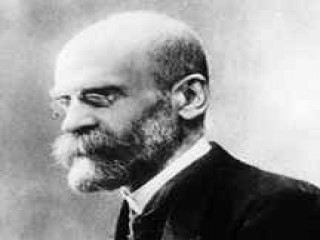
Emile Durkheim biography
Date of birth : 1858-04-15
Date of death : 1917-11-15
Birthplace : Epinal, Lorraine, France
Nationality : French
Category : Science and Technology
Last modified : 2011-04-03
Credited as : Philosopher, and socilogist,
The French philosopher and sociologist Emile Durkheim was one of the founders of 20th-century sociology.
Emile Durkheim was born at Epinal, Lorraine, on April 15, 1858. Following a long family tradition, he began as a young man to prepare himself for the rabbinate. While still in secondary school, however, he discovered his vocation for teaching and left Epinal for Paris to prepare for theEcole Normale, which he entered in 1879. Although Durkheim found the literary nature of instruction there a great disappointment, he was lastingly inspired by two of his teachers: the classicist Numa Denis Fustel de Coulanges and the philosopher Emile Boutroux. From Fustel he learned the importance of religion in the formation of social institutions and discovered that the sacred could be studied rationally and objectively. From Boutroux he learned that atomism, the reduction of phenomena to their smallest constituent parts, was a fallacious methodological procedure and that each science must explain phenomena in terms of its own specific principles. These ideas eventually formed the philosophical foundations of Durkheim's sociological method.
From 1882 to 1885 Durkheim taught philosophy in several provincial lycees. A leave of absence in 1885-1886 allowed him to study under the psychologist Wilhelm Wundt in Germany. In 1887 he was named lecturer in education and sociology at the University of Bordeaux, a position raised to a professorship in 1896, the first professorship of sociology in France.
On his return from Germany, Durkheim had begun to prepare review articles for the Revue philosophique on current work in sociology. In 1896, realizing that the task was too much for a single person to do adequately, he founded the Annee sociologique. His purpose, he announced, was to bring the social sciences together, to promote specialization within the field of sociology, and to the E make evident that sociology was a collective, not a personal, enterprise. In 1902 Durkheim was named to a professorship in sociology and education at the Sorbonne. There he remained for the rest of his career.
The Division of Labor, Durkheim's doctoral thesis, appeared in 1893. The theme of the book was how individuals achieve the prerequisite of all social existence: consensus. Durkheim began by distinguishing two types of "solidarities," mechanical and organic. In the first, individuals differ little from each other; they harbor the same emotions, hold the same values, and believe the same religion. Society draws its coherence from this similarity. In the second, coherence is achieved by differentiation. Free individuals pursuing different functions are united by their complementary roles. For Durkheim these were both conceptual and historical distinctions. Primitive societies and European society in earlier periods were mechanical solidarities; modern European society was organic. In analyzing the nature of contractual relationships, however, Durkheim came to realize that organic solidarity could be maintained only if certain aspects of mechanical solidarity remained, only if the members of society held certain beliefs and sentiments in common. Without such collective beliefs, he argued, no contractual relationship based purely on self-interest could have any force.
At the end of the 19th century, social theory was dominated by methodological individualism, the belief that all social phenomena should be reduced to individual psychological or biological phenomena in order to be explained. Durkheim therefore had to explain and justify his emphasis on collective beliefs, on "collective consciousness" and "collective representations." This he did theoretically in The Rules of Sociological Method (1895) and empirically in Suicide (1897). In the first, he argued that the social environment was a reality and therefore an object of study in its own right. "Sociological method," he wrote, "rests wholly on the basic principle that social facts must be studied as things; that is, as realities external to the individual." The central methodological problem was therefore the nature of these realities and their relationship to the individuals who compose society.
In Suicide Durkheim demonstrated his sociological method by applying it to a phenomenon that appeared quintessentially individual. How does society cause individuals to commit suicide? To answer this question, he analyzed statistical data on suicide rates, comparing them to religious beliefs, age, sex, marital status, and economic changes, and then sought to explain the systematic differences he had discovered. The suicide rate, he argued, depends upon the social context. More frequently than others, those who are ill-integrated into social groups and those whose individuality has disappeared in the social group will kill themselves. Likewise, when social values break down, when men find themselves without norms, in a state of "anomie" as Durkheim called it, suicide increases.
From what source do collective beliefs draw their force? In The Elementary Forms of Religious Life (1912) Durkheim argued that the binding character of the social bond, indeed the very categories of the human mind, are to be found in religion. Behind religion, however, is society itself, for religion is communal participation, and its authority is the authority of society intensified by being endowed with sacredness. It is the transcendent image of the collective consciousness.
During his lifetime Durkheim was severely criticized for claiming that social facts were irreducible, that they had a reality of their own. His ideas, however, are now accepted as the common foundations for empirical work in sociology. His concept of the collective consciousness, renamed "culture," has become part of the theoretical foundations of modern ethnography. His voice was one of the most powerful in breaking the hold of Enlightenment ideas of individualism on modern social sciences.
Durkheim died in Paris on Nov. 15, 1917.
















